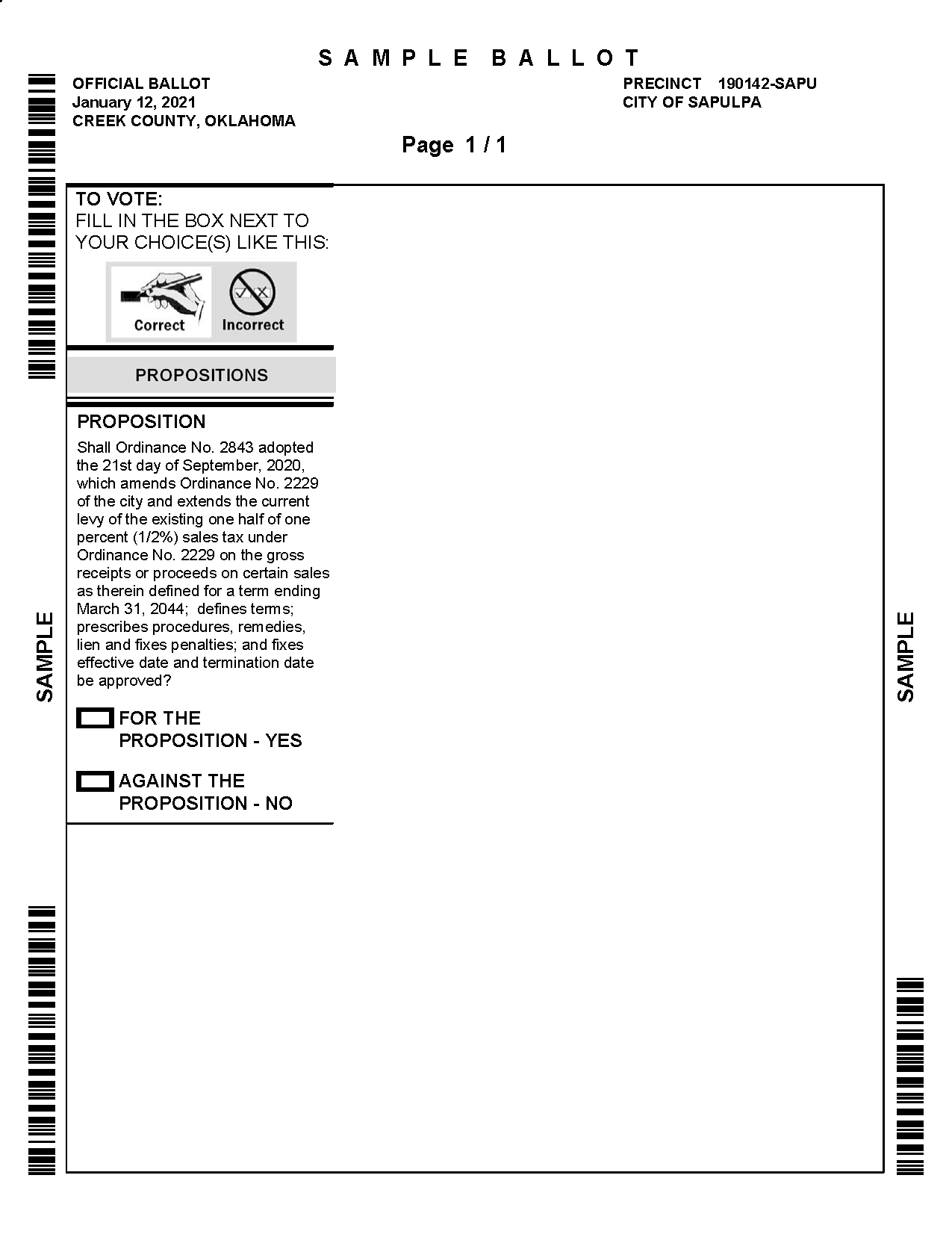Another wasteful special election
This is not what democracy looks like.
Sixteen Oklahoma jurisdictions -- Sapulpa, Pawhuska, other cities and towns, two school districts, a technology (vo-tech) district, and a county -- had propositions on the ballot today. Mostly bond issues, I suspect.
State law allows for 11 election dates in odd-numbered years, and that allows officials a degree of control over turnout by scheduling a vote on an unexpected day and minimizing publicity, notifying only likely Yes voters, so as to sneak a proposition past their constituents.
There ought to be a law to require proposition elections to be held on the corresponding general election day for the political subdivision. Until there is such a law, voters can deter this behavior by turning out en masse to vote against whatever happens to be on the ballot today. Here's the list from the Oklahoma State Election Board:
- Hammon Public Schools (Beckham, Custer & Roger Mills Counties)
- City of Piedmont (Canadian & Kingfisher Counties)
- City of Sapulpa (Creek & Tulsa Counties)
- City of Town of Arapaho (Custer County)
- Town of Fairmont (Garfield County)
- Kremlin-Hillsdale Schools (Garfield & Grant Counties)
- Hughes County
- Town of Terral (Jefferson County)
- Eastern Oklahoma Tech Center (Lincoln, Logan, Oklahoma, Pottawatomie Counties)
- Town of Kingston (Marshall County)
- Town of Webbers Falls (Muskogee County)
- City of Pawhuska (Osage County)
- City of Shawnee (Pottawatomie County)
- City of Wewoka (Seminole County)
- Town of Muldrow (Sequoyah County)
- Town of Burns Flat (Washita County)
And here are the results for the January 12, 2021 special elections. 125 precincts were open for business (about 5% of the statewide total), requiring three precinct officials at each precinct, plus county election board officials in 21 counties. Those 21 counties had to offer early in-person voting, but only 159 voters availed themselves of the opportunity.
Each precinct had exactly one proposition on the ballot. In 20 precincts, no one voted, nor were there any absentee or early votes cast by residents of the tiny sliver of Sapulpa in Tulsa County (two Tulsa County Sapulpans voted in person on election day). A grand total of 4,740 votes were cast.
Kingfisher County Election Board had to open up to support one election (City of Piedmont road tax) in one precinct (370103) in which there were no eligible voters (all voters in the precinct live outside the city limits, which are mainly in Canadian County).
All the propositions passed, except one: Voters in the City of Piedmont turned down a $28/month road tax by 81% to 19%. 1,213 voters turned out, about 25% of the number of eligible voters.
Piedmont's raw vote totals were exceeded only by the Eastern Oklahoma County Technology Center, with 1,228 votes cast, but that was accomplished in a district covering parts of four counties, with about 10 times the number of registered voters.
The smallest turnout was in Webbers Falls: 20 votes for and no votes against the renewal of OG+E's utility franchise.
Hughes County only managed 557 votes on a bond issue for funding $950,000 for the Hughes County Emergency Medical Services District, a cost to the average taxpayer of $1 per month.
It's hard to find out exactly what was being voted on, but so far, none of the issues appear to be emergent, or even urgent. 445 citizens of Sapulpa voted on extending a half-penny sales tax until March 31, 2044, but there's no mention of the election on the city website or Facebook page. In order to find out what was on the ballot, I had to pick a Sapulpa voter from the voter file, go to the Oklahoma voter tool, and then input the name and birthdate so that it would show me a sample ballot.
372 voters in the City of Pawhuska approved a 20-year one-cent sales tax to fund the local hospital. No mention of the election on the city's website or Facebook page, but at least the local paper ran a short news story.
No doubt every town published the required legal notices, but they don't seem to have bothered to publish in a way that would attract the notice of all eligible voters.
I return to my proposed schedule for Oklahoma elections: Every year a June primary, August runoff, and November general election. In odd-numbered years, school, municipal, county, and other local elections; in even-numbered years, federal and state elections. Propositions would only be permitted on the November election; if held on another date (because of a genuine emergency) they would require the approval of 50% of registered voters, which would give the locality an incentive to call attention to the election. Whether a shortened election calendar is passed or not, a quorum requirement seems like a reasonable innovation.
0 TrackBacks
Listed below are links to blogs that reference this entry: Another wasteful special election.
TrackBack URL for this entry: https://www.batesline.com/cgi-bin/mt/mt-tb.cgi/8772
